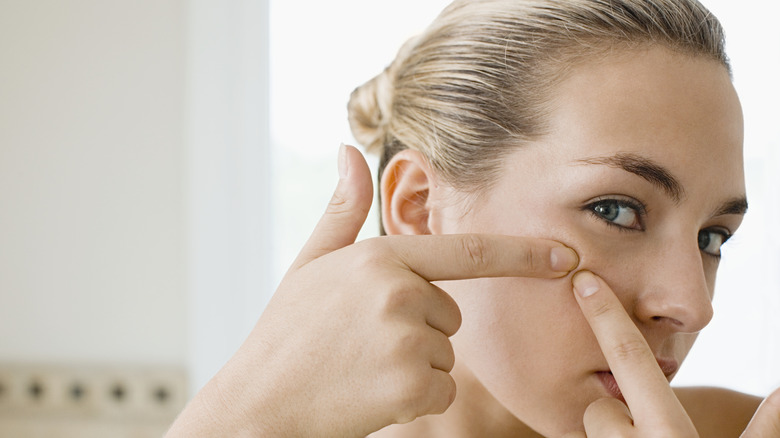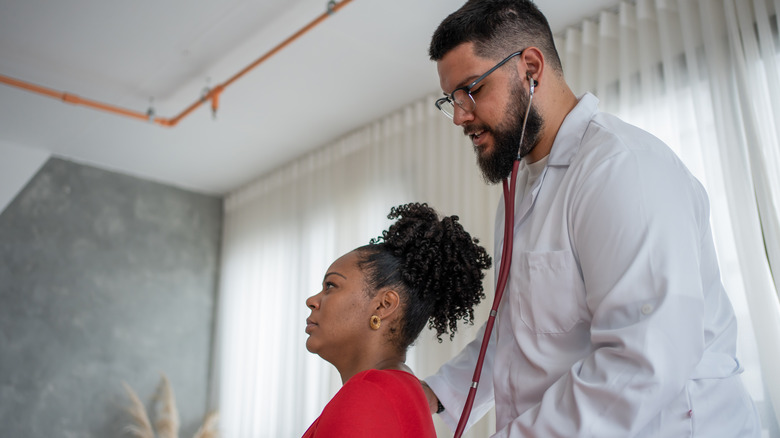Medical Expert Clears Up The Confusion Around Hormone Balancing - Exclusive
Spend some time on your social media feeds and before long, you'll probably discover something about hormone balancing. Hormone balancing is the topic du jour. Certain areas of TikTok are chock full of influencers claiming that after balancing their hormones, the excess weight melted off their tummies. They've never had more energy; their skin has never been clearer; and their mood? Never better.
As for what "hormone balancing" really means, that's a little more complicated. "It's such a generic term, and there are so many hormones — cortisol, testosterone, estrogen, insulin, thyroid hormones, growth hormones — all with various functions that don't really overlap," Arti Thangudu, MD, told Popsugar. It gets more complicated from there. Something that is good for one hormone might not be good for another. It's a lot of information to sort through, especially if you're doing it on your own. Medical experts caution against relying on unverified sources on social media for medical recommendations. "My guess is that women turn to social media because they don't feel heard or supported by their healthcare provider," Dr. Jill Purdie, an OB/GYN and medical director at Northside Women's Specialists, told Motherly.
To cut through the confusion on social media, Women spoke exclusively to Dr. Akash Bajaj of Remedy Wellness & Anti-Aging in Marina Del Rey, CA. We get into the nitty-gritty of balancing hormones.
Should you be worried about hormones?
According to Dr. Akash Bajaj, who spoke exclusively to Women about hormone balancing, getting started can be difficult. The problem is that many of the symptoms associated with hormone imbalance are also common ailments of everyday life. "We have become so accustomed to living in a suboptimal state that oftentimes that is a telltale sign of hormone imbalance," Dr. Bajaj said. "This can include fatigue, low libido, low energy, loss of ambition or desire, foggy thinking, [moodiness] or irritability, hot flashes (in women), and emotional lability."
If you are experiencing any of the above symptoms and can't trace them to something like a highly stressful job, relationship, or recent illness, it could be your hormones. In that case, opt for a blood test to confirm what exactly your imbalances are, rather than drastically altering what you're eating or drinking before you have all the information. The good news is if you can't fit a doctor's appointment into your schedule or your insurance won't cover an endocrinologist's visit, plenty of companies will test your hormones for a small fee.
If your hormones are imbalanced, a blood test should tell you exactly what is out of whack and how to get back on track. As Dr. Bajaj pointed out, "We live in a time where it is so easy to diagnose and treat these issues, optimizing your entire existence. I mean, why wouldn't you invest in yourself?"
How to start
Once you've assessed exactly how your hormones are imbalanced, you can try to remedy the problem. Speaking exclusively with Women, Dr. Akash Bajaj warned against putting too much faith in social media. "On TikTok, many influencers claim that small changes, like drinking more water or cutting out certain foods, can effectively treat hormone-related issues like PCOS," he said. "Optimizing your diet, nutrition, and exercise will certainly allow your body, like an engine, to function optimally. However, there is little evidence to suggest that this will cure PCOS." While it may not cure PCOS (Polycystic ovary syndrome), diet can definitely help. People who suffer from PCOS produce an abnormal amount of androgens, so a diet full of lean meats and low-fat dairy or legumes is a great place to start. Other hormone-related disorders like Type 2 diabetes can be aided with a plant-based diet, according to a study published in the Journal of Geriatric Cardiology.
In addition to eating healthier, Dr. Bajaj suggested investing in supplements as a good way to add some stability to your hormones. "Certainly, there are certain supplements that can assist with hormone optimization. Especially if you are just a little off," he said. As with anything medical, though, be aware of what you're buying. "Hormonal supplements can actually be very dangerous," Dr. Arti Thangudu warned PopSugar. "Some of these supplements are pharmaceuticals — they're just not FDA-regulated or regulated by anybody."
When to see a doctor
So, if you suspect something is wrong with your hormones — maybe a panel even proves it — when should you fix it yourself, and when should you book it to the doctor? The truth is, while there are things you can do on your own, it's a lot faster (and safer) to have a professional's input. "Ultimately, if you want to optimize your hormones, why would you do it without supervision? These are arguably the most important chemicals in your body affecting things like glucose absorption, muscle mass, mood, and ability to think," said Dr. Akash Bajaj, speaking exclusively with Women.
Additionally, if you try and treat yourself before seeing a doctor, you are just putting off getting actual help, Dr. Bajaj warned. Or, even worse, you could potentially be doing more damage than good to your hormones without the input of a doctor.
Still, discussing various vague symptoms with a busy doctor can be intimidating. Dr. Bajaj said that bedside manners and proper training are paramount to combat this. "Find the right doctor first of all. So many general practitioners and even some specialists who are untrained or unfamiliar with proper optimization will miss the opportunity to help you become unstoppable," he said. Most importantly, though, try not to get discouraged. Fixing a hormone issue can be a system of trial and error. " ... [Y]ou are basically allowing yourself to live as a shadow of who you could be," Dr. Bajaj said. "The clock is ticking."



